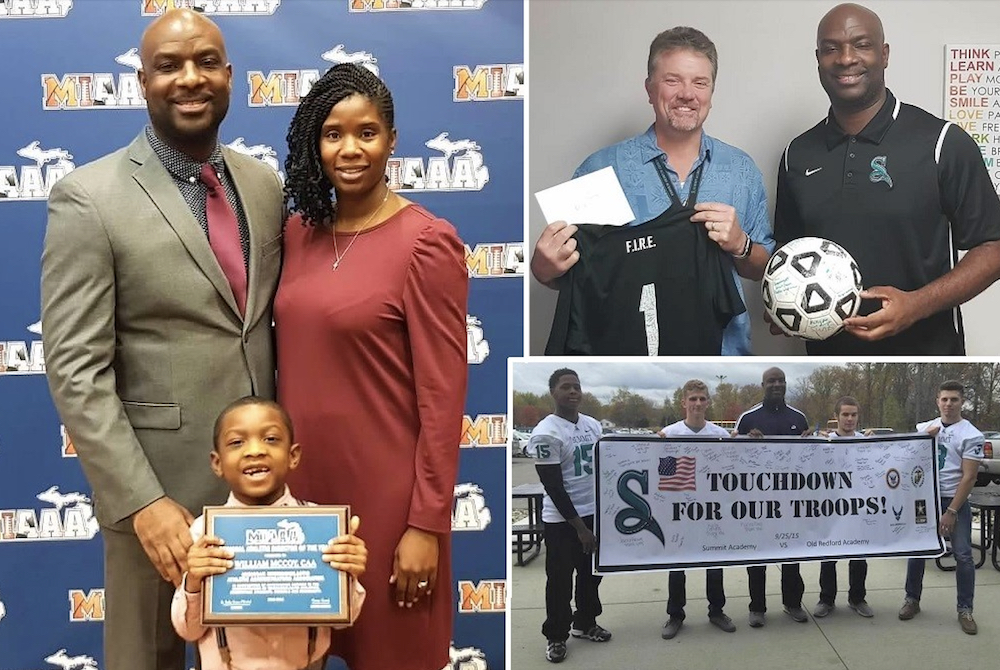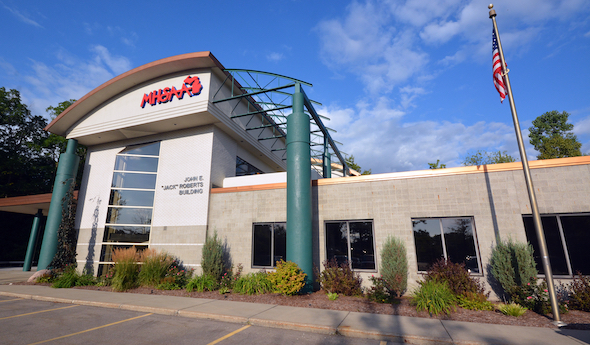
Summit Academy North's McKoy to Bring Vast Experiences to MHSAA Staff
By
Geoff Kimmerly
MHSAA.com senior editor
June 23, 2021
Will McKoy realized fairly early in his sports career at Northwest Halifax High School in Littleton, N.C., that he likely wouldn’t be picking up a college scholarship playing basketball or competing in track & field.
But he did figure out during those experiences what he wanted to do in college and after, thanks to the impact made on him by his basketball coach.
“He was the athletic director as well, and I thought that was the coolest job,” McKoy said. “From early on, when I was in high school, I knew that’s what I wanted to do – be a basketball coach and athletic director.”
McKoy got a taste of coaching while a student assistant from 2006-09 at Wayne State University. And when he graduated that spring, that’s what he figured he’d do next – teach physical education and coach basketball, landing a job at Detroit Henry Ford Academy School for Creative Arts. He would work toward landing an athletic director’s job eventually.
Two weeks after he was hired, and before school had even begun, eventually showed up – his new school needed an AD, and McKoy jumped in.
He learned quickly, and on the fly. And a decade later, his role in school sports has grown to include a statewide voice with an opportunity to make that level of impact daily, drawing on experiences as district athletic director, conference president, member of the MHSAA’s Representative Council as well as a Division I college football official and sergeant in the U.S. Army.
McKoy has been named to an assistant director’s position with the MHSAA, effective in mid-July. He will serve as the administrator for football and girls and boys basketball, among other responsibilities. He will be taking up many of the duties of current assistant director Nate Hampton, who will be retiring in July after 32 years on staff.
McKoy has served as district athletic director for Summit Academy North Schools in Romulus since 2011 after previously serving two years as athletic director at Henry Ford Academy. He also has served as president, vice president, and commissioner of multiple sports for the Charter School Conference, while working as an NCAA football official since 2009.
He has provided advocacy for schools statewide and perspective particularly from the Metro Detroit and charter school communities during his two years serving on the Representative Council, and those connections will continue to be valuable in his new role, as will his variety of past experiences.
“To me, the opportunity to affect change at the next level, and then working with a diverse group within the entire state – not just my niche, but the entire state – is exciting to me,” McKoy said. “Vitally for me, and I think part of the attraction of the position, was trying to figure out ways to bridge the gap between the suburbs, rural schools and city schools, particularly with some of the needs of the Detroit Public Schools and charter schools as well, trying to help them be successful with everything the MHSAA does to support those schools.”
Summit Academy North opened in 1996 for students grades K-5 and expanded instruction to include K-12 the following year, and athletics have increased their overall success substantially under McKoy.
He has increased the number of opportunities at all levels – notably with the creation of elementary intramurals and expansion of the middle and high school athletic program from 19 to a peak of 41 teams for grades 7-12, including 17 on the varsity level. Nine of those varsity teams have won a league title during his tenure. The baseball team has won eight conference championships with McKoy as AD, the softball team six and the boys cross country team last fall won its 10th-straight league title and sent a runner to the MHSAA Finals for the second-straight year.
The school’s boys basketball varsity advanced to the Division 2 Quarterfinals this season, after winning its first District and Regional championships. The football team has amassed its best four-year stretch (25-13), the bowling programs have sent at least one competitor to the Finals four straight seasons and the girls track & field team this spring won its first league title. The volleyball, girls soccer, boys soccer, girls cross country and wrestling teams also have won either a league or District title under his leadership of the department.
McKoy also oversaw the expansion of the Charter School Conference from eight to its current 16 member schools.
“We’re tremendously excited to have Will joining our staff,” MHSAA Executive Director Mark Uyl said. “His background, experience and energy are something we are thrilled to have in our building.”
McKoy received his certified athletic administrator (CAA) designation from the National Interscholastic Athletic Administrators Association (NIAAA) in 2014. He was named his region’s Athletic Director of the Year in 2019 by the Michigan Interscholastic Athletic Administrators Association (MIAAA). In addition to the MIAAA and NIAAA, McKoy is a member of the Michigan Collegiate Football Officials Association (MCFOA) and Basketball Coaches Association of Michigan (BCAM).
His officiating experience has included working at the Division I level in the Mid-American Conference and Missouri Valley Conference. He also worked from 2014-16 and again during 2017-18 with the National Football League as an instant replay booth and field communicator and K-Ball coordinator.
McKoy is honorably discharged from the U.S. Army, having served as a human resources sergeant from 1999-2004 with assignments in Germany, Kuwait and also Iraq for 13 months during Operation Iraqi Freedom. He earned a bachelor’s degree in physical education in 2009 from Wayne State University, and a master’s in sports administration from Wayne State in 2011.
McKoy is married to wife Terri McKoy and the father of sons William Jr. and Winston.
PHOTOS courtesy of William McKoy and Romulus Summit Academy North schools.

From the Director: Back to School
August 7, 2020
By Mark Uyl
MHSAA Executive Director
Since March 12, our world has been anything but normal. These times have tested most everything in life, and as summer turns toward fall, we find ourselves still with far more questions than answers. It has been said that an abnormal reaction to an abnormal situation is normal behavior.
Let me start with these abnormal times. I’ve had many conversations with administrators over the past month about the start of school and school sports. The one constant theme is these are anything but normal times. Many of these conversations have moved to the issue of schools starting the academic year virtually while considering whether or not to offer school sports opportunities this fall. Let me share the things that have been part of almost all conversations on this topic.
The loudest message I hear is kids are going to be playing sports this fall someplace. Period. If we believe that kids are going to take the fall off if school sports aren’t offered, we haven’t been paying much attention since May. Since that time, athletic activity has taken place in the club, travel, AAU and non-school space nearly every day. From first-hand experience, many of these events have implemented ZERO of the safety standards and protocols that businesses and schools have adopted for their plans of return. The non-school world generally has plowed ahead this summer with few-to-no rules, regulations, enforcement, oversight and accountability to anyone. If kids are going to be playing sports, our member schools are telling us that activity needs to be in the safest environment possible – which is with professional educators and trained coaches in our school sports world.
Schools are quick to point out that kids have been conditioning and training with school coaches in school-sponsored workouts most of the summer. We believe that the absence of virus outbreaks among our 749 high schools’ summer activities, involving thousands of kids, has been because schools have been following the return-to-activity plans. Districts have told us they can continue doing what they’ve been doing safely since June by following all COVID guidance and regulations we have put in place with government’s leadership and partnership.
Schools starting the year virtually are telling us they will use the lessons learned from the start of sports for when students return to campus later in the fall. School administrators have shared this view privately as this has become a highly-charged topic among various groups within our school communities. Sports allow schools to bring students back to campus in small, consistent and defined groups with the same adults working with those students each day. In school sports, there is little mixing of students from one sport with those students in another – making it much easier to monitor, track and trace kids when needed than if all students were in the buildings, hallways and classrooms all day. We hear from administrators that valuable lessons can be learned with athletics in August and September for a successful school start-up with students back on campus in October.
All of us share the fundamental belief that we must protect the health and safety of individuals first. This doesn’t include only COVID prevention measures, but also the mental health of teenage students and adults as well. In districts that are starting the school year online, they see athletics being the one shred of normalcy students, and staff members who choose to coach, will have during the fall. It’s a chance to safely interact with peers and get needed physical activity that hasn’t been happening for some kids since March. Health and safety has to include all facets of the individual, and more research is being shared each day about how mental health is becoming a critical issue. For many at-risk kids, sports is the one motivating factor to keep them in school and progressing toward graduation. Given the challenges of all online education for these at-risk kids, sports and the daily routine they bring perhaps would be more important for this group of students than ever before.
With no school sports, the affluent communities and families can navigate online learning during the day and then afford the non-school athletic opportunities that kids and families in less-affluent areas simply cannot. In many communities, school sports can provide opportunities and open doors that would not appear if kids become priced-out from participating and competing.
The past five months have been the most abnormal in a century. School sports being the one pathway back to school for students in our state – the one norm for this fall – run by professional educators who put kids first, would be an incredible boost to the physical and mental health of all of us. We believe that school sports can be done safely and smartly, and the MHSAA has developed plans that do just that. While the optics of sports taking place while waiting for in-person education is not what any of us prefer, we believe we must react to these abnormal times by thinking differently and looking at these unique times through a unique lens.
Trying to find one normal for our kids in these abnormal school days might just be the best thing we can do.

